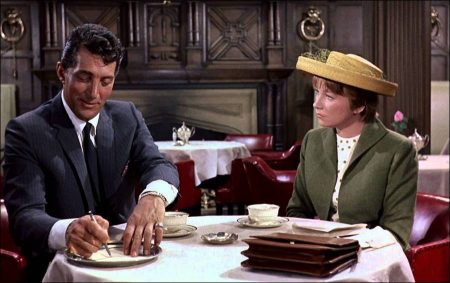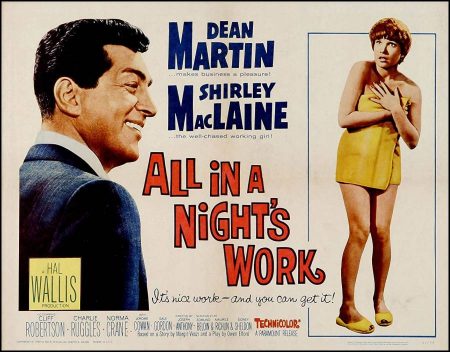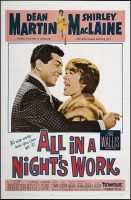Taglines: It’s nice work – and you can get it!
All in a Night’s Work movie storyline. Colonel Ryder, the publisher of a magazine, dies while on vacation. Tony, his swinging nephew, inherits the magazine and takes over. Presently, the magazine is planning to expand and to do so they need some capital.
Tony’s trying to arrange a loan through his friend. He is then informed by the hotel detective of the hotel that his uncle died in, that on the night of his death, a woman, wearing only a towel, came out of his room, and ran away before the detective could catch up with her. They suspect that the Colonel was “with” her on the night he died, cause he was smiling when he died.
Tony and two of his uncle’s confidants are worried that not only if the bank hears of this they will not get the loan but the magazine wholesome image could be tarnished. So they ask the detective to stay around so he could identify her. What they don’t know is that the woman is Katie Robbins, one of the magazine’s researchers and that she entered the room by “accident”. When the detective identifies her and after having a few misconceived conversations with her, they suspect that she is trying to extort them, and she thinks that Tony’s a nut.
All in a Night’s Work is a 1961 American Technicolor romantic screwball comedy film directed by Joseph Anthony and starring Dean Martin, Shirley MacLaine, Cliff Robertson, Charles Ruggles, Norma Crane, Jack Weston, John Hudson, Jerome Cowan, Gale Gordon, Mabel Albertson, Mary Treen and Roy Gordon.
Film Review for All in a Night’s Work
It is our considered opinion that they tell us too early along in Hal Wallis’ “All in the Night’s Work” that the principal character is as pure as snow.Almost at the start, they tip us that this girl, played by Shirley MacLaine in what we would cautiously label her most ladylike comedy style, was not up to any hanky-panky when she was seen emerging from a gentleman’s hotel room wrapped in nothing more formal than a bath towel and a state of considerable alarm.
They let us know, rather clearly, that she was simply passing through that wealthy gentleman’s room, trying to escape another fellow whom she had just saved from drowning in a swimming pool.Although this is valid information and assures us that Miss MacLaine is much more sensible than she was in “The Apartment” (in which she turned out to be a naughty girl), it might have been more entertaining if they had let us proceed through the film, suspecting, as does the leading man, Dean Martin, that she had been in that room for no good.
This might have kept us guessing how it would all turn out when Mr. Martin sets his traps to prevent her from spilling the dirt on the hotel gentleman (who was dead). And that might have given more interest to this considerably lightweight farce.As it is, there is not the slightest question about the goodness of Miss MacLaine. She’s just a dumb little girl who went to Florida and got caught in an odd embarrassment. And when Mr. Martin starts to ply her with compliments, courtship and champagne, there’s no question that, sooner or later, the prosaic truth will out.
That’s how it is with this picture, which opened yesterday at the Normandie and the Victoria. No matter how hard the actors try, no matter how cute the situations and how glib the dialogue, it is just one prolonged anticlimax. We know the truth about the heroine—and it is dull. However, the actors do labor. Miss MacLaine and Mr. Martin spar and weave with a great deal more determination than the plot seems to justify. Cliff Robertson works like a Trojan as Miss MacLaine’s sober fiancé, and Charles Ruggles is briefly delightful as the latter’s father who gets soused.Edmund Beloin and Maurice Richlin have planted some cracky complications in their script and Joseph Anthony has directed for a perceptible casualness and ease. But it is very thin and obvious. We know too soon that the fix is in.
All in a Night’s Work (1961)
Directed by: Joseph Anthony
Starring: Dean Martin, Shirley MacLaine, Cliff Robertson, Charles Ruggles, Norma Crane, Jack Weston, John Hudson, Jerome Cowan, Gale Gordon, Mabel Albertson, Mary Treen, Roy Gordon
Screenplay by: Edmund Beloin, Maurice Richlin, Sidney Sheldon
Cinematography by: Joseph LaShelle
Film Editing by: Howard A. Smith
Costume Design by: Edith Head
Set Decoration by: Sam Comer, Arthur Krams
Art Direction by: Hal Pereira, Walter H. Tyler
Music by: André Previn
MPAA Rating: None.
Distributed by: Paramount Pictures
Release Date: March 22, 1961
Views: 250


